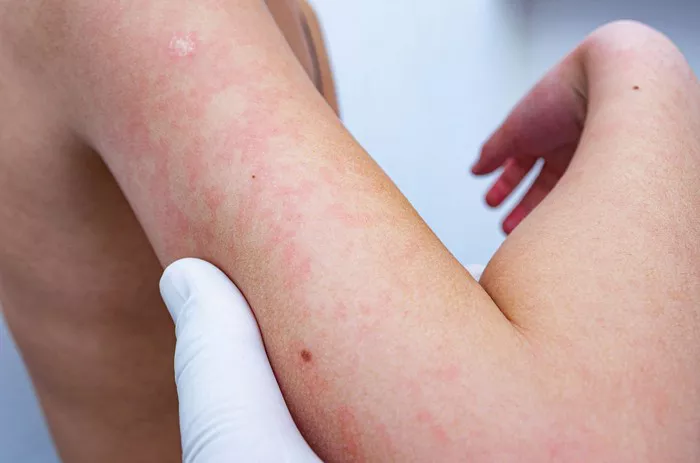Hives, also known as urticaria, are a common skin reaction characterized by raised, itchy welts. While they often manifest as a response to allergens or irritants, the causes of unexpected hives can be more elusive and perplexing. Delving into the intricacies of this condition reveals a multitude of potential triggers, ranging from environmental factors to underlying health issues. Understanding these triggers is paramount in effectively managing and preventing unexpected hives.
The Immune System’s Role
At the core of hives lies the body’s immune system, which plays a pivotal role in identifying and combating perceived threats. When the immune system detects an allergen or irritant, it triggers the release of histamine and other chemicals, leading to inflammation and the characteristic rash associated with hives. However, in cases of unexpected hives, the immune system’s response may be triggered by factors that are less readily apparent.
Environmental Factors
Environmental triggers are among the most common culprits behind unexpected hives. These can include exposure to extreme temperatures, such as cold or heat, as well as sunlight or water. Additionally, certain airborne substances, such as pollen, dust mites, or pet dander, can provoke an immune response in susceptible individuals. Identifying and avoiding these triggers can help minimize the risk of hives.
Stress and Emotional Factors
The mind-body connection is a well-established phenomenon, and stress and emotional factors can exert a profound influence on the immune system. Heightened levels of stress, anxiety, or emotional distress can trigger the release of stress hormones, which in turn may stimulate the immune system and contribute to the onset of hives. Managing stress through relaxation techniques, mindfulness, and other coping strategies can be instrumental in reducing the frequency and severity of unexpected hives.
Medications and Supplements
Certain medications and supplements have been implicated in causing hives as a side effect. These can include antibiotics, nonsteroidal anti-inflammatory drugs (NSAIDs), and blood pressure medications, among others. Additionally, herbal supplements and vitamins may contain ingredients that can trigger an allergic reaction in sensitive individuals. It is important to consult with a healthcare professional before starting any new medication or supplement regimen to minimize the risk of adverse reactions.
Underlying Health Conditions
In some cases, unexpected hives may be symptomatic of an underlying health condition. Autoimmune disorders, such as lupus or thyroid disease, can manifest with skin rashes, including hives. Similarly, infections, such as viral or bacterial infections, may trigger an immune response that results in hives. Other potential underlying causes include hormonal imbalances, thyroid disorders, and even certain types of cancer. Proper diagnosis and management of these underlying health issues are essential in addressing the root cause of unexpected hives.
Food and Food Additives
Food allergies are a well-known trigger for hives, but certain foods and food additives can also provoke a reaction in susceptible individuals. Common culprits include shellfish, nuts, dairy products, and food additives such as preservatives, colorings, and flavorings. Identifying and eliminating trigger foods from the diet can help prevent unexpected hives in those who are prone to food-related reactions.
Insect Bites and Stings
Insect bites and stings are another potential trigger for hives, particularly in individuals who are allergic to insect venom. The immune system’s response to insect venom can vary widely, ranging from mild itching and swelling to a severe allergic reaction known as anaphylaxis. It is essential for individuals with a known allergy to insect venom to carry an epinephrine auto-injector (such as an EpiPen) and to seek immediate medical attention in the event of a severe reaction.
Idiopathic Urticaria
In some cases, hives may occur without a discernible trigger, a condition known as idiopathic urticaria. This diagnosis is reserved for cases in which the underlying cause of hives remains unknown despite thorough evaluation. Idiopathic urticaria can be frustrating to both patients and healthcare providers, as it may require ongoing management to control symptoms and prevent recurrences.
Conclusion
Unexpected hives can be a source of frustration and discomfort for those affected, but unraveling the triggers behind this condition is key to effective management and prevention. By understanding the diverse array of factors that can contribute to hives, from environmental triggers to underlying health conditions, individuals can take proactive steps to minimize their risk and lead healthier, more comfortable lives. Collaboration between patients and healthcare providers is essential in identifying triggers, implementing preventive measures, and managing symptoms when they arise.With knowledge and diligence, unexpected hives can be effectively managed, allowing individuals to reclaim control over their skin health and overall well-being.
Related Topics:


























